ACT Program Curriculum
The ACT Program curriculum is relationship-centered, empirically informed, culturally-responsive, anti-racist, anti-oppressive, trauma-informed, healing-forward, and developmentally focused.
The ACT Program curriculum is designed to fill the gaps in knowledge, skills, and perspectives required to provide relationship-centered, empirically informed, culturally-responsive, anti-racist, anti-oppressive, trauma-informed, healing-forward, and developmentally focused services to support the relational health and wellbeing of infants and young children (prenatal to age 5 years) and their parents and caregivers. Enrolled professionals develop perspectives, knowledge, and skills to:
- support early social-emotional and relational development of children from prenatal to five years of age;
- understand how mental/relational health develops during the prenatal through early childhood period in the context of relationships and surrounding environmental influences;
- provide dyadic, triadic, and family-centered mental/relational health support to families caring for young children prenatal to 5 years; and
- address families’, communities’, and our own experiences of adversity, trauma, and systemic oppression.
The ACT Program is designed as a learning community. This means that ACT Program participants will travel through the learning process together in relationship that we will encourage to continue beyond the completion of the program 15 months later. The learning community strives to create a relationally safe environment where participants can learn with and from one another, and through that relationship build and strengthen each person’s capacity to navigate, reconcile, and celebrate differences in knowledge, experiences, and perspectives. In the context of the learning community, we hold Jaree Pawl’s wisdom, adapted by Maria St. John and Carmen Rosa Noroña…
"Who we are influences how we are and that is as important as what we do."
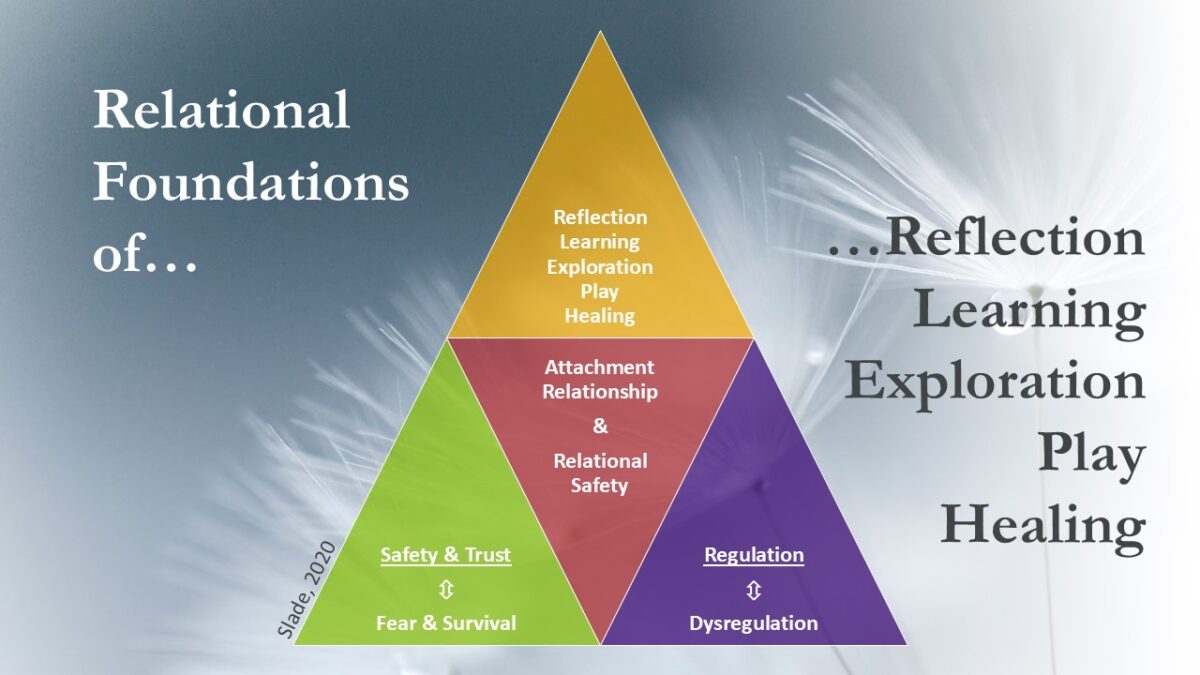
ACT Program Curriculum Description
Over the course of the 15-month program, each cohort of participants will engage in over 270 hours of facilitated learning including the 2 supporting activities – Infant Observation and Reflective Practice Consultation Groups (RPCGs).
Foundations of Infant and Early Childhood Mental Health
The first six months are dedicated to foundational knowledge in infant and early childhood mental health. These are the perspectives, knowledge, and skills essential for all professionals who touches the lives of young children (prenatal to age 5 years) and their families.
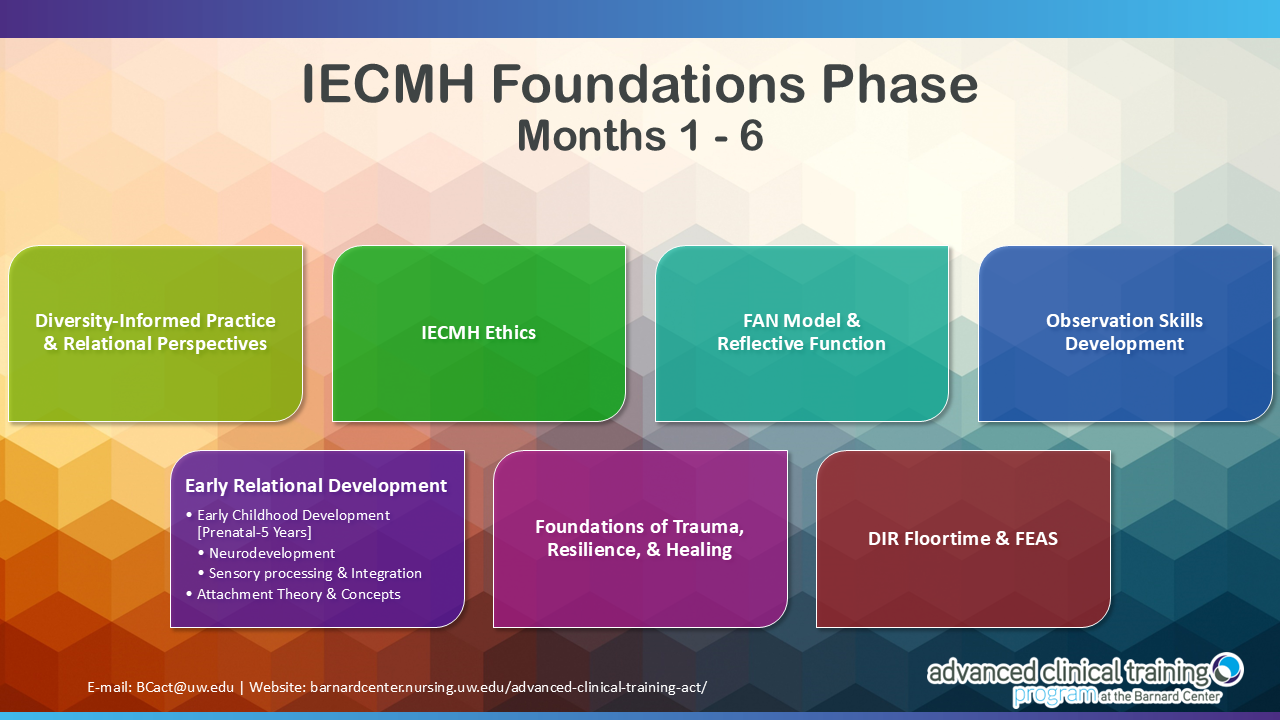
Advanced Clinical Training
The subsequent nine months during the Advanced Clinical Training Phase, the program is dedicated to developing interpersonal engagement and critical self-reflective and -reflexive skills utilizing a community psychoanalytic/psychodynamic framework and relational perspectives important for supporting and facilitating intergeneration engagement, i.e. working with children and caregivers together as dyads, triads, or families. Through case studies, observational activities, and reflection, participants will apply foundational knowledge in early childhood development and relational health to their work with families and other professionals caring for young children. Participants will further develop and deepen their assessment and engagement processes and approaches with parents and caregivers who themselves are often struggling with the impacts of trauma, loss, and related biopsychosocial challenges, all in the service of facilitating and supporting healing relationships and recovery processes necessary for relational health and wellbeing. In addition to the traditional focus on relational processes and perspectives and the reflective stance, ACT integrates diversity-informed practice principles based on the Diversity-Informed Tenets for Work with Infants, Children and Families (Tenets) — introduced early during the Foundations Phase and embedded throughout the 15 months — to prepare participants to address the influences of systemic and structural inequities on the lives of young children (prenatal to age 5 years), families, ourselves, and our practice. This includes the understanding of deeply rooted social, cultural, economic, and political influences of narrowly defined standards and norms derived from our nation’s history of colonization, enslavement, and genocide.
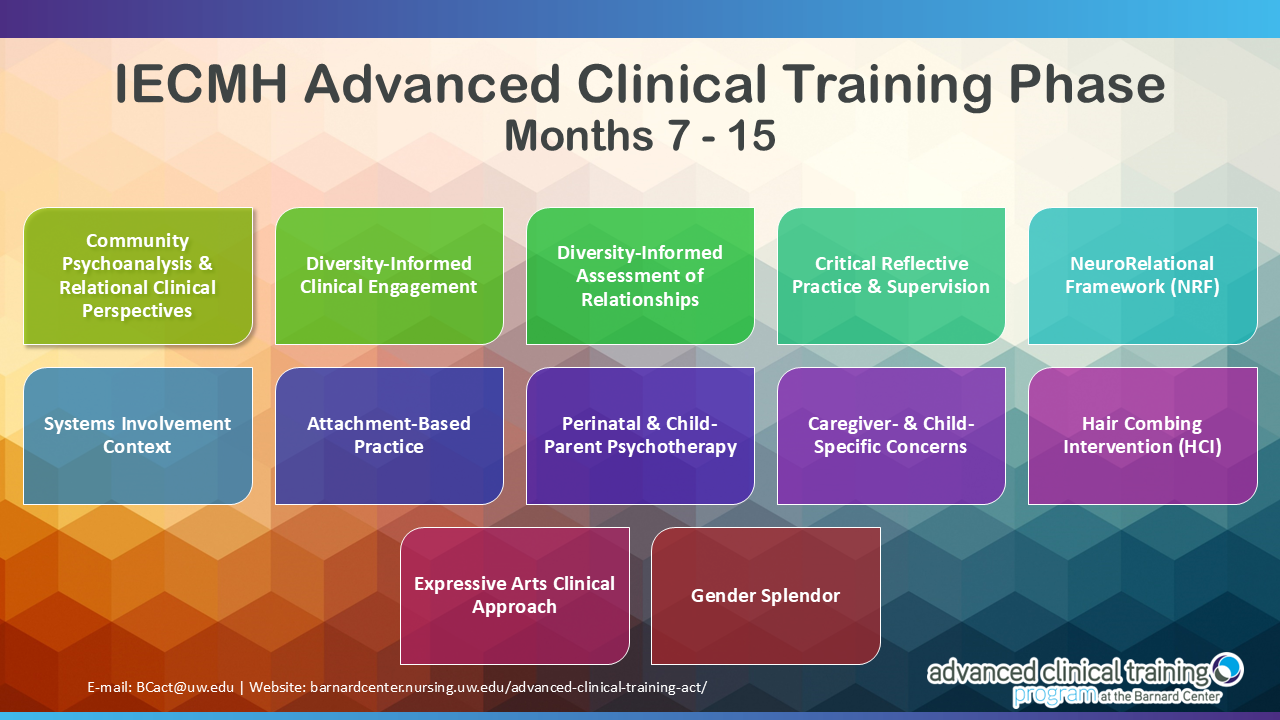
Infant Observation (IO) Description
Infant Observation is a supporting activity that spans 12 months of the ACT Program beginning in Month 3. ACT Program participants are responsible for recruiting a family who is expecting in their late third trimester or has recently given birth. Consent forms will be provided. Participants will be oriented to the observation model and objectives of Infant Observation during Months 1 & 2 of the program. Participants are encouraged to complete at least nine 1-hour long observations during the 12-month period (9-12 hours total). Observations can be via in-person visits or video conferencing. Each month, participants will gather virtually in designated facilitated reflection groups. Each monthly Infant Observation Reflection Group is 90 minutes long (18 hours total). Infant Observation offers a special window into the early relational developmental processes during the earliest days, weeks, and months after birth and insights into each participants’ observational process and strategy.
Facilitated Reflective Practice Consultation Group (RPCG) Description
ACT Program participants assign themselves into facilitated Reflective Practice Consultation Groups (RPCGs). RPCGs offer opportunities for participants to reflect on and integrate program content learning with their current practice experiences. Participants are encouraged to consult on the application of new knowledge and skills. RPCGs are 90 minutes long and occur twice monthly usually following weekend content learning sessions across the 14 months of the ACT Program (42 hours total). RPCGs provide further opportunities to build relationships and engage in collaborative and mutual learning for the learning community.
With the Tenets as the guiding framework, the program curriculum scaffolds perspectives, knowledge, and skills to transform “how we are” — relationship-centered, empirically informed, culturally-responsive, anti-racist, anti-oppressive, healing-forward, and developmentally focused — supporting the health and wellbeing with young children (prenatal to age 5 years) and theirs families through healing relationships.
Program Structure + Time Commitment
The image below provide a graphic representation of month across the Foundations and ACT Phases with the concurrent supporting activities over the 15-month program timeframe.
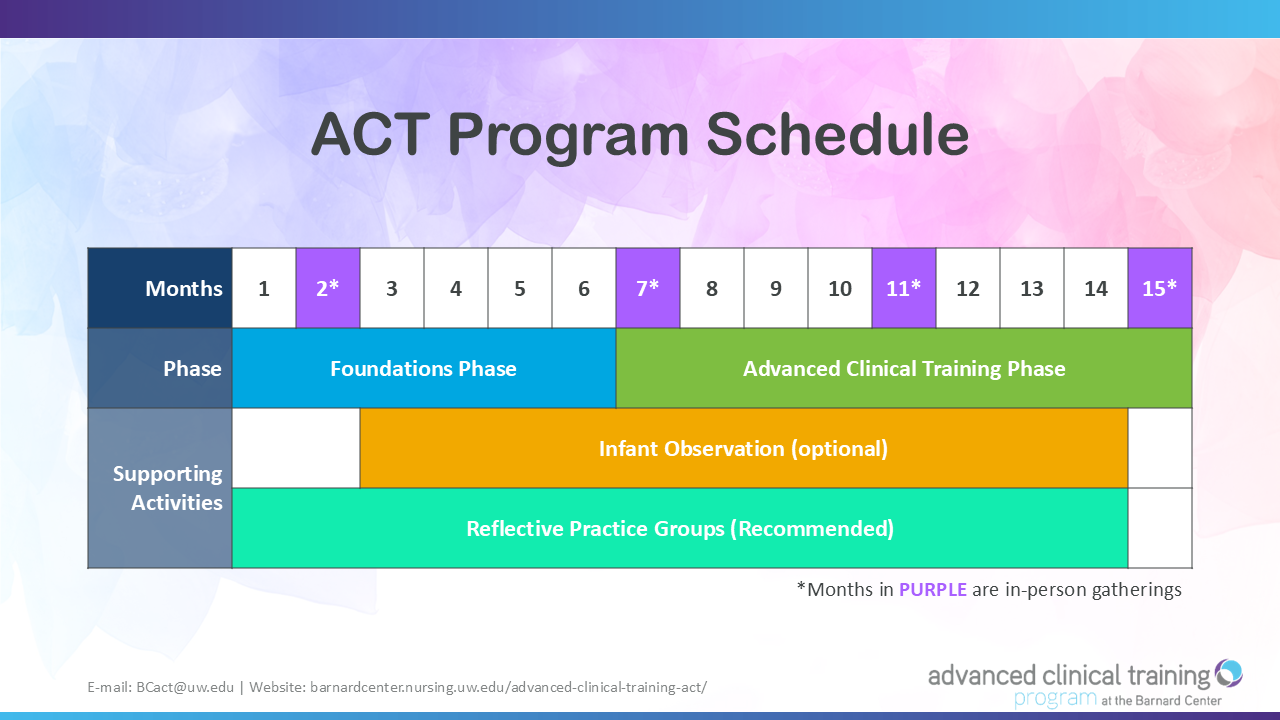
The ACT Program is designed for working professionals who may not be able to take time away from supporting children and families during the work week. However, the intensive nature of the program does require some work release time as well as weekends for content learning sessions and some weekday time for supporting activities.
The COVID-19 pandemic has shifted the world and the ways in which we communicate and interact. We proceed holding in mind that COVID-19 is here to stay and plan for learning community cohorts to be hybrid in structure with the majority of content learning sessions being delivered via synchronous Zoom meetings and strategically scheduled in-person gatherings over the 15-months of the program. This structure supports our attention to accessibility of the program to participants across Washington and from neighboring states, deepening relationships and community building with 4 in-person weekends and ameliorating travel time and expenses for those who will have to travel.
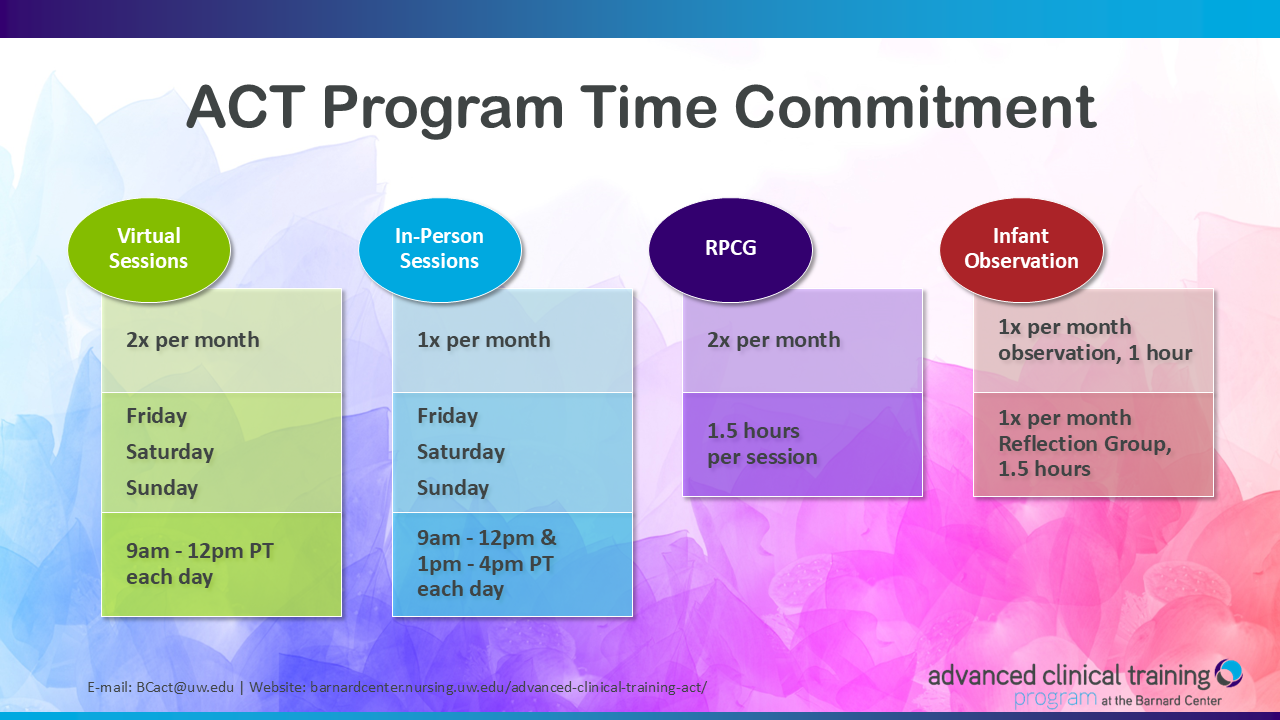
Recognizing the fatiguing effects that many experience from online engagement, we plan for most virtual sessions to be 3 hours long per day, to be held every other week on Fridays, Saturdays, and Sundays with alternative schedules to accommodate holiday observances and popular vacation seasons.
Monthly Infant Observation virtual visits will be determined in agreement with the volunteer families. The monthly 90-minute Infant Observation Reflection Groups and the two monthly 90-minute Reflective Practice/Consultation Groups will likely be scheduled on weekday evenings.
We encourage you to review the Program Schedule and the next cohort’s Tentative Calendar as you consider whether your participation in the ACT Program is a good fit for you at this time in your personal and professional life.

